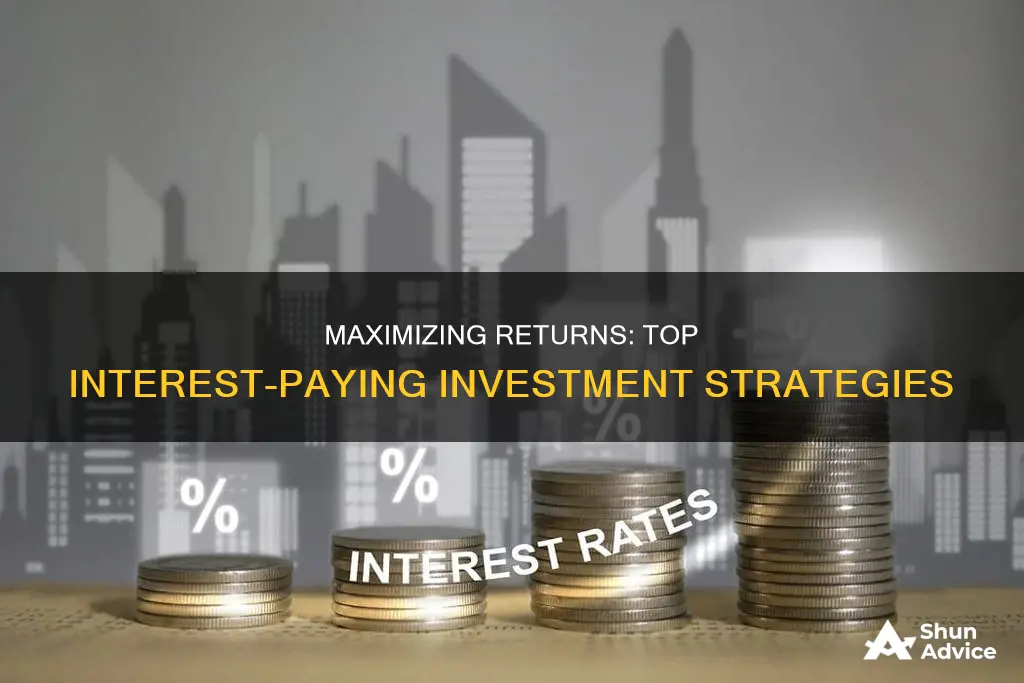
When it comes to growing your money, understanding which investment options offer the highest interest rates is crucial. Whether you're a seasoned investor or just starting, knowing what investment pays the most interest can significantly impact your financial goals. From savings accounts and certificates of deposit (CDs) to bonds and stocks, each type of investment has its own unique characteristics and potential returns. In this article, we'll explore the various factors that influence interest rates and provide insights into the top-performing investments to help you make informed decisions about your financial future.
What You'll Learn
- High-Yield Savings Accounts: Offers competitive interest rates for easy access to funds
- Bonds: Government or corporate debt instruments with fixed interest payments
- CDs: Time deposits with guaranteed interest rates for a fixed term
- Money Market Funds: Low-risk investment pools with high liquidity and interest earnings
- Dividend Stocks: Investing in companies that pay regular dividends with attractive yields

High-Yield Savings Accounts: Offers competitive interest rates for easy access to funds
High-yield savings accounts are a popular choice for those seeking a safe and accessible way to grow their money while still having easy access to their funds. These accounts offer a competitive edge in the financial market by providing higher interest rates compared to traditional savings accounts. This feature makes them an attractive option for individuals looking to maximize their savings without compromising liquidity.
When considering investments that pay the most interest, high-yield savings accounts are often at the top of the list. They are designed to offer a higher return on your deposits, allowing your money to work harder for you. The interest rates on these accounts can vary, but they typically provide a more favorable rate than standard savings accounts, which often have very low or even negative interest rates in some cases. This competitive advantage is particularly appealing to those who want to make the most of their savings without taking on excessive risk.
One of the key advantages of high-yield savings accounts is the accessibility they offer. Unlike some other investment options that may lock up your funds for extended periods, these accounts provide easy access to your money. You can typically withdraw funds at any time without incurring significant penalties, making them ideal for emergency funds or short-term savings goals. This feature ensures that your savings remain liquid and readily available when needed, providing a sense of security and control over your finances.
To find the best high-yield savings account, it's essential to research and compare different providers. Many online banks and credit unions offer these accounts, often with no minimum balance requirements, making it accessible to a wide range of individuals. When comparing options, consider factors such as the interest rate, any fees associated with the account, and the overall reputation of the financial institution. Additionally, look for accounts that offer features like mobile banking, online bill pay, and the ability to link to other accounts, as these can enhance the overall user experience and convenience.
In summary, high-yield savings accounts are a smart choice for those seeking to maximize their savings while maintaining easy access to their funds. With competitive interest rates and the flexibility to withdraw money without penalties, these accounts provide a safe and accessible way to grow your wealth. By carefully researching and selecting the right provider, individuals can make the most of their savings and work towards their financial goals.
Safe and Simple: Low-Risk Investments That Earn Interest
You may want to see also

Bonds: Government or corporate debt instruments with fixed interest payments
Bonds are a type of investment that can provide a steady stream of income through fixed interest payments. When you buy a bond, you are essentially lending money to the issuer, which could be a government or a corporation. In return, the issuer promises to pay you a fixed amount of interest at regular intervals, typically annually or semi-annually. This interest payment is a form of compensation for the use of your capital and is often referred to as the bond's coupon rate.
The interest rate on a bond is a critical factor in determining its potential to generate significant returns. Bonds with higher coupon rates will pay out more in interest over time, making them attractive to investors seeking regular income. For example, if you purchase a bond with a 5% coupon rate, you can expect to receive 5% of the bond's face value as interest annually. This is a straightforward and predictable way to earn interest, especially compared to other investments that may offer variable returns.
Government bonds are often considered a safe and reliable investment option. They are typically backed by the full faith and credit of the issuing government, which means there is a lower risk of default. As a result, government bonds often offer lower interest rates compared to corporate bonds, which carry a higher risk due to the possibility of the issuing company defaulting on its debt. However, government bonds are still a valuable part of a diversified investment portfolio, providing a stable source of income and a hedge against market volatility.
Corporate bonds, on the other hand, are issued by companies to raise capital for various purposes, such as financing expansion projects or refinancing existing debt. These bonds often offer higher interest rates than government bonds due to the increased risk associated with corporate debt. Investors should carefully assess the creditworthiness of the issuing company to ensure they can meet their interest and principal repayment obligations. Corporate bonds can be a good way to diversify a portfolio and potentially earn higher returns, but they come with a higher level of risk.
In summary, bonds, whether government or corporate, offer a consistent and predictable way to earn interest. The interest rate or coupon rate is a key determinant of the potential returns, with higher rates generally leading to more substantial interest income. Investors should consider their risk tolerance, investment goals, and the current market conditions when deciding whether to invest in bonds. A well-diversified portfolio may include a mix of government and corporate bonds to balance risk and reward.
Unraveling the Dollar's Rate Impact: A Guide to Investing Strategies
You may want to see also

CDs: Time deposits with guaranteed interest rates for a fixed term
When considering investments that offer the highest interest rates, one option to explore is certificates of deposit, commonly known as CDs. These financial instruments are time deposits offered by banks or credit unions, providing a secure and predictable way to grow your money over a fixed period. CDs are an attractive choice for those seeking a stable and potentially lucrative return on their investments.
CDs function similarly to savings accounts but with a key difference: they typically offer higher interest rates, especially for longer-term deposits. When you open a CD, you agree to keep your money in the account for a specified period, known as the term. During this time, the bank guarantees a fixed interest rate, ensuring that your investment grows according to the agreed-upon terms. This feature makes CDs an appealing choice for risk-averse investors who prioritize capital preservation and a guaranteed return.
The interest earned on CDs is calculated based on the initial deposit amount and the agreed-upon term. For instance, if you deposit a certain amount into a 1-year CD, you'll earn a predetermined interest rate over that year. The longer the term, the higher the potential interest rate, as banks compensate for tying up your money for an extended period. This structure allows investors to benefit from compound interest, where the interest earned in previous periods is added to the principal, leading to exponential growth over time.
One of the advantages of CDs is the security they offer. Unlike some other investment options, CDs are insured by the Federal Deposit Insurance Corporation (FDIC) or similar financial institutions in other countries, ensuring that your principal and earned interest are protected up to a certain amount. This insurance provides peace of mind, especially for those who prioritize risk mitigation in their investment strategy.
Additionally, CDs offer flexibility in terms of term lengths. You can choose from various maturity periods, ranging from a few months to several years. Longer-term CDs generally provide higher interest rates, but they also require a longer commitment. It's essential to evaluate your financial goals and risk tolerance before selecting a CD term. For those seeking a higher return, longer-term CDs can be a viable strategy, but it's crucial to consider the potential impact of market fluctuations and interest rate changes during the investment period.
Interest Rates and Foreign Investment: A Model for Economic Growth
You may want to see also

Money Market Funds: Low-risk investment pools with high liquidity and interest earnings
Money market funds are a type of investment vehicle that offers a unique blend of safety and profitability. These funds are designed to provide a stable and secure investment option, particularly for those seeking a low-risk approach to growing their wealth. By investing in money market funds, individuals can access a diversified portfolio of highly liquid assets, ensuring both capital preservation and a steady stream of interest income.
The primary characteristic that sets money market funds apart is their focus on low-risk investments. These funds primarily invest in short-term, high-quality securities, such as government bonds, commercial paper, and treasury bills. This conservative approach minimizes the potential for significant losses, making it an attractive choice for risk-averse investors. Despite the low-risk nature, money market funds still offer competitive interest rates, providing investors with a reliable source of income.
One of the key advantages of money market funds is their high liquidity. Investors can typically access their funds within a short period, often within a day or two. This liquidity is crucial for those who need quick access to their money without incurring significant penalties or losses. Additionally, the funds' short-term nature means that they are less susceptible to market volatility, providing a more stable investment environment.
Interest earnings from money market funds are generally competitive compared to other low-risk investments. The funds' strategy of investing in short-term securities allows them to take advantage of market opportunities and generate consistent returns. While the interest rates may not be as high as some other investment options, they offer a reliable and predictable income stream, making them an attractive choice for conservative investors.
In summary, money market funds are an excellent choice for individuals seeking a low-risk investment strategy with a focus on liquidity and interest earnings. These funds provide a safe haven for investors who want to grow their wealth without exposing themselves to significant market risks. With their diversified portfolio of short-term securities, money market funds offer both capital preservation and a steady income, making them a valuable addition to any investment portfolio.
Interest Rate Hike Impact: Investment Strategies in Flux
You may want to see also

Dividend Stocks: Investing in companies that pay regular dividends with attractive yields
Dividend stocks are an attractive investment strategy for those seeking a steady income stream and long-term wealth accumulation. This approach involves investing in companies that consistently pay out a portion of their profits to shareholders in the form of dividends. These dividends provide investors with a regular cash flow, making it an appealing option for those looking to generate passive income. The appeal of dividend stocks lies in their ability to offer both capital appreciation and a steady income, making them a popular choice for investors seeking stability and growth.
When investing in dividend stocks, it's essential to focus on companies with a strong track record of paying dividends and a commitment to maintaining or increasing these payouts over time. These companies often have a solid financial foundation, indicating a lower risk of dividend cuts. Investors should look for businesses with a history of consistent dividend payments, as this stability can provide a reliable source of income. Additionally, companies with a strong balance sheet and a history of reinvesting profits back into the business are often good candidates for dividend investors.
One key aspect to consider is the dividend yield, which is calculated by dividing the annual dividend per share by the stock's current price. A higher dividend yield can indicate a more attractive investment opportunity, especially for those seeking income. However, it's important to remember that a high yield doesn't necessarily guarantee the stability of the dividend. Investors should also analyze the company's dividend payout ratio, which represents the percentage of earnings paid out as dividends. A sustainable payout ratio suggests that the company can afford to pay dividends consistently.
Diversification is another crucial strategy when investing in dividend stocks. Building a portfolio of various dividend-paying companies across different sectors can help mitigate risk. This approach ensures that investors are not overly exposed to the performance of any single company or industry. By diversifying, investors can benefit from the stability of dividends while also positioning themselves to capture potential capital gains as the market grows.
In summary, dividend stocks offer investors a way to generate regular income through consistent dividend payments. By focusing on companies with a strong dividend history and financial stability, investors can build a diversified portfolio that provides both income and long-term growth potential. This investment strategy is particularly appealing to those seeking a more passive approach to investing, allowing them to benefit from the power of compounding dividends over time.
Exploring the World of Alternative Investments: My Intriguing Journey
You may want to see also
Frequently asked questions
The investment that typically pays the most interest is a high-yield savings account or a money market account. These are relatively safe options, often offered by banks, and can provide higher interest rates compared to traditional savings accounts. They are accessible and liquid, allowing you to easily withdraw funds when needed.
While there are no guaranteed investments that will always pay high interest, certain vehicles can offer competitive rates. Certificates of Deposit (CDs) are a popular choice, where you agree to keep your money in the account for a fixed period, and in return, you earn a guaranteed interest rate. The longer the term, the higher the potential interest.
Diversification is key to maximizing interest earnings. Consider a mix of investments such as bonds, fixed deposits, and peer-to-peer lending platforms. Each of these has different risk profiles and interest rates. Additionally, regularly reviewing and rebalancing your portfolio can help optimize returns. It's also beneficial to stay informed about market trends and economic factors that influence interest rates.







